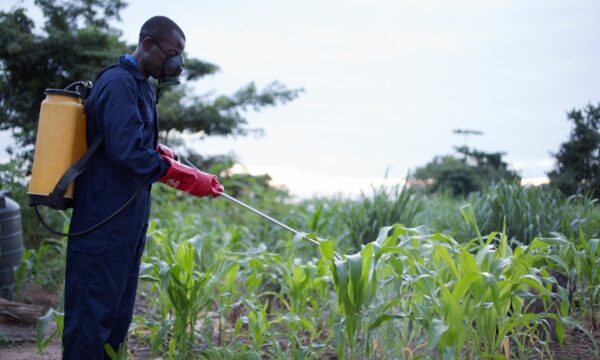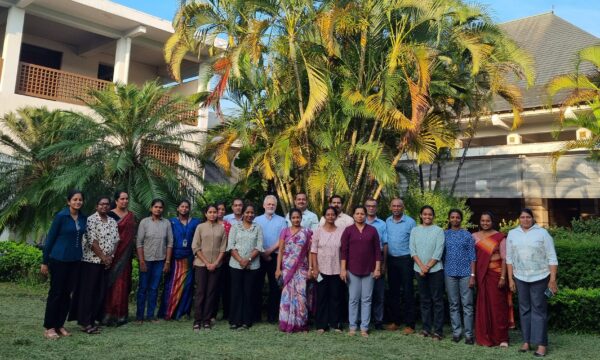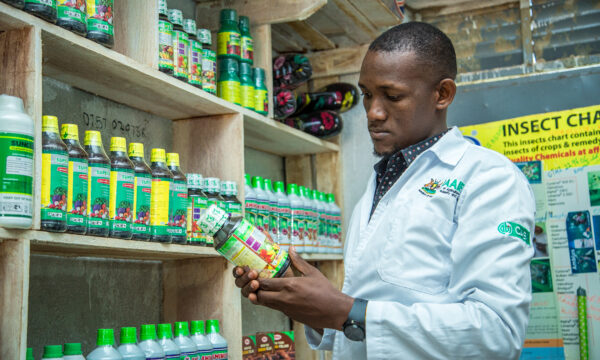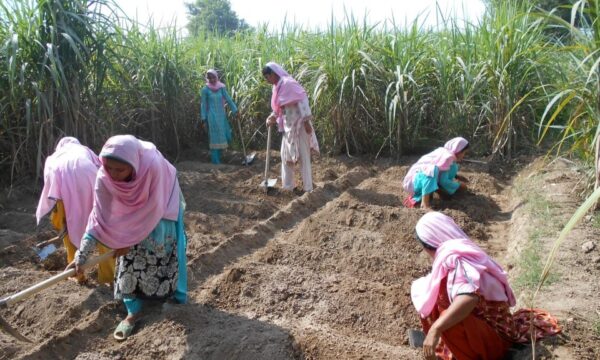
Chemical pesticides can be an important part of a pest management strategy, helping to prevent food losses and waste. Synthetic fungicides, herbicides and insecticides can effectively control pest threats, and this is beneficial for food production. However, pesticides have a downside. They pose a health risk to consumers, farmers, animals and the environment. These risks are increased when pesticides are not used properly.
Pesticide misuse can dramatically increase the threats that pesticides pose. This includes choosing the wrong type of pesticides, overusing them, not wearing the right personal protective equipment (PPE) and not disposing of them correctly. When this happens, farmers’ and spray service providers’ health can be affected, and pesticide residues on produce can exceed safe limits for consumers. Biodiversity and wildlife can also be harmed. The adoption of safer practices around pesticide handling makes a big difference in reducing the risks
Reducing the risks by changing behaviours
Launched in 2022 as a pilot and 2023 as a full project, Ukulima True is an innovative agricultural project delivered by PlantwisePlus the Department of Agriculture, Nakuru County, Kenya and the Centre for Behaviour Change Communication (CBCC). The campaign seeks to reduce the risks that pesticides pose to people within the food value chain. It does this by fostering safer pesticide practices, influencing change of positive individual behaviours and practices and supporting systems that facilitate these changes. It creates an enabling environment by working with many different stakeholders to address common challenges. The project also raises awareness of alternative safer plant protection products that are effective, readily available and affordable for farmers.

Looking at the bigger picture, the project highlights the benefits that communication for social behaviour change can bring to the wider community and even the planet. Environmental benefits and the sense of ‘doing the right thing’ can incentivise change.
Supporting farmers as business people
It is important to remember that farmers are ultimately business people, and they make decisions based on their perception of (financial) risk. Pest damage to crops can be an initial indication of worse problems to come, including losses that are so substantial that they cause the farmer to lose everything. Certain pesticide use behaviours can occur as a result of these risk perceptions and the farmer’s desire to control the risks.
Furthermore, safer pesticide alternatives and options are still often unavailable and unknown, so farmers rely on the practices and products they know. They operate within an existing system that influences their access to and use of inputs like pesticides. The whole system – from agro-input dealer certification to biopesticide regulation – can influence behaviours around pesticide use. The system as a whole can facilitate or limit these behaviours and depends on many factors. For example, are pesticide alternatives available and is regulation in place to manage counterfeit products? However, by sharing knowledge, offering safer options for pesticide use and responding to farmers’ cost-benefit needs, priorities and threat perceptions, it is possible to incentivise change.
Pesticide use put into song 🎶

One novel aspect of the campaign is its focus on pride in farmers’ work. This idea arose in response to a perception of farming as a less desirable career choice. Insights from farmers about their perception of their role in feeding the nation have been worked into the project. Subsequently, part of the campaign’s messaging aims to boost the value and visibility of farmers ‘doing the right thing’. The message is that smallholders protect sustainable farming. The project even created a song to embody these values.
Where to start pesticide use behaviour change?
A social and behaviour change strategy and campaign plan was developed for Nakuru County in Kenya. Nakuru was selected for several reasons:
- Horticulture is a major business in Nakuru, where pesticide use is prevalent.
- Nakuru offered a location where actions with other actors could be connected.
- The Food Safety Committee in Nakuru is active; it presented an entry point for the project.
The project needed to reach many different stakeholders to ensure success. At face value, it might appear that safe pesticide use is an issue mainly influenced by farmers. However, it is influenced by many people, from agro-input dealers to policymakers. Therefore, behaviour change for safer pesticide use must reach many people beyond those who grow the produce.
The social and behaviour change strategy identified five interconnected groups of stakeholders. It put the farmer at the centre but linked them to other community members. It developed different communication strategies for each group.

Reaching a wide array of stakeholders
For farmers, the campaign ran mass media campaigns on the radio and delivered peer-to-peer learning and role modelling by farmer champions. The campaign delivered tailored messaging using an ‘interpersonal engagement approach’. In particular, it did this using radio dramas and radio spots that mirrored the farmers’ specific challenges and shared positive ways to adopt practices. For agro-dealers, it concentrated on training to enhance the dealers’ ability to advise farmers. When communicating with extension workers, the campaign worked to build technical capacity. It also fostered ways to support extensionists’ outreach activities to smallholders.
Policymakers are an essential group to consider when it comes to pesticide risk reduction since policy and regulation impact people’s behaviour. The campaign supported policy coordination through various structures at the county level and below.
The project has yielded strong results. Following the first phase of the campaign the number of farmers now monitoring their fields for pests has increased by 41%. Early detection of pests is important as it helps to minimize the amount of pesticide needed. The number of farmers who always use PPE has also increased by 28%. The number of farmers calibrating their sprayers has similarly increased by 28%. Equipment calibration can help to reduce the amount of pesticide used.

Learning lessons on behaviour change around pesticide use
When it comes to social behaviour change, the project learnt several vital lessons. One important lesson was the value of linking the campaign to people like spray service providers who can act as proponents for using non-chemical pesticide alternatives like biopesticides. It was also critical to provide training and support for these champions. The campaign promoted them as experts who can support pesticide risk reduction techniques. Doing so also helped to increase demand for their businesses.
The project launched and promoted the Crop Sprayer App as a tool. This app provides guidance on calibrating spray pumps and addressing calibration issues. CABI has now made the tool available in Swahili. It helped the campaign to increase awareness about calibrating sprayers for effectiveness and safety. It also drove usage of the app.
The project also linked to national policy activities on pesticide risk reduction, and it supported the availability of lower-risk products. For example, the project created linkages that enabled community-based IPM champions to access manufacturer discounts for lower-risk products. This helped to create youth employment opportunities and increase farmers’ access to these products. CABI collected feedback about this. It then included the information in an e-learning course for agro-dealers on pesticide risk assessment. When complete, this can be released in Nakuru County for agro-dealers. It will contribute to the end goal of pesticide risk reduction.
And finally, working with the county governments was critical. It enabled the inclusion of campaign messages into extension policies. It also created a link to national-level activities in pesticide risk reduction. This can help to make safer and lower-risk plant protection products available at a national level. The campaign brought about partnership opportunities with like-minded organizations, expanding its reach to other parts of Nakuru County, Nyandarua County and Transzoia County.
For more information, see Ukulima True.
Ukulima True – a Kenyan farming campaign to help reduce the risk of pesticides
PlantwisePlus gratefully acknowledges the financial support of the Directorate-General for International Cooperation (DGIS), Netherlands; European Commission Directorate General for International Partnerships (INTPA, EU); the Foreign, Commonwealth & Development Office (FCDO), United Kingdom; and the Swiss Agency for Development and Cooperation (SDC).
1 Comment
Leave a Reply
Related News & Blogs
How do pest risk registers address the spread of plant pests in Africa?
Pest risk registers can help to solve problems in agriculture, addressing the growing global threat of plant pests. Moreover, changing weather patterns, led by rising temperatures, are causing them to reproduce faster and expand into new regions. In ad…
10 July 2025





This is an exciting and effective and efficient way of approaching pesticides risks in our food systems. Hope this is scaled out to the entire sub Saharan region of Africa where the food safety risk is life threatening.